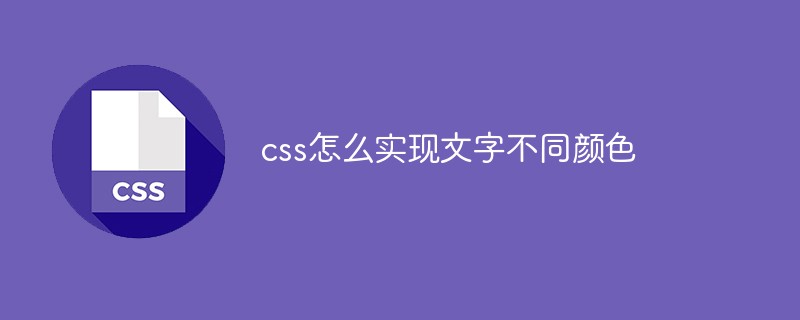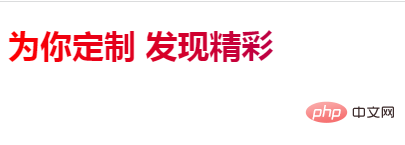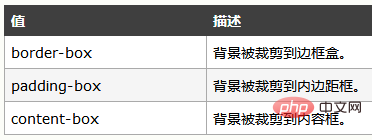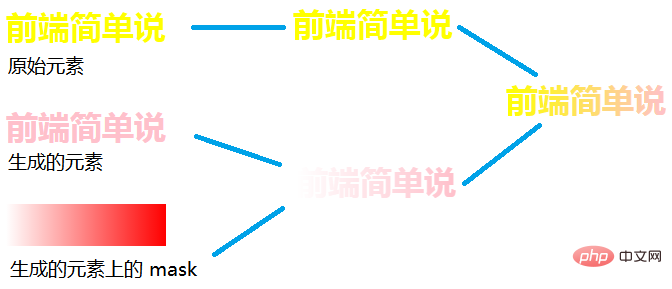How to achieve different colors of text in css
Two methods: 1. Use background-clip, the syntax is "text element {background-image: linear-gradient(..); background-clip: text; color: transparent;}". 2. Use mask, the syntax is "text element {color: color value 1;} text element: before {mask: linear-gradient(..); color: color value 2;}".

The operating environment of this tutorial: Windows 7 system, CSS3&&HTML5 version, Dell G3 computer.
In CSS, you can achieve different colors of text by adding gradient effects to text elements. The following introduces two ways to achieve text gradient effects.
Method 1: linear-gradient() background-clip
There is no direct property to set in CSS Text gradient, usually text can only be solid color. However, you can use background clipping to make the background color appear in the text area, which looks like the text has a gradient.
Rendering

##Code
<!DOCTYPE html>
<html>
<head>
<meta charset="utf-8">
<style>
.text {
background-image: linear-gradient(to right, red, blue);
background-clip: text;
-webkit-background-clip: text;
color: transparent; /*需要文字透明*/
}
</style>
</head>
<body>
<h1 id="为你定制-nbsp-发现精彩">为你定制 发现精彩</h1>
</body>
</html>background: linear-gradient(to right, red, blue); This line sets the background to a gradient color. Please note that this is an abbreviation. In fact, background-image is set to a gradient color, not background-color, but the background image is set to a gradient color.
-webkit-background-clip: text; This line will talk about the background-clip attribute:
Syntax
background-clip: border-box|padding-box|content-box;
 ##The above does not mention the value of text. Seeing the previous prefix, you should also think that it has compatibility issues and is not currently supported by all browsers.
##The above does not mention the value of text. Seeing the previous prefix, you should also think that it has compatibility issues and is not currently supported by all browsers.
The value of text means that the text in the block is used as the cropping area to be cropped outward. The background of the text is the background of the block, and the area outside the text will be cropped.
So, we finally write
color: transparent; to make the text transparent, which means that the background color behind it will be displayed.
Method 2: linear-gradient() mask
 Code
Code
<!doctype html>
<html>
<head>
<meta charset="UTF-8" />
<style type="text/css">
h1{
position: relative;
color: yellow;
}
h1:before{
content: attr(text);
position: absolute;
z-index: 10;
color:pink;
-webkit-mask:linear-gradient(to left, red, transparent );
}
</style>
</style>
</head>
<body>
<h1 id="前端简单说">前端简单说</h1>
</body>
</html>Use the content attribute to specify the content to be inserted.
content value attr is used to get the attribute value, content:attr(attribute name);
content: attr(text);
can get the element text attribute. The text attribute here is a custom attribute. You can also add a tt attribute to the element, like this<h1 id="Front-end-in-brief">Front-end in brief </h1>
Then the content attribute is written like this, content: attr(tt); It will also work. Okay, let’s continue talking about the key point of the second method, the mask attribute. You can read the article: https://www.php.cn/css-tutorial-494998.html
We can understand the principle of the second method by looking at the pictureSimply put, the mask attribute allows a certain part of the element to be displayed or hidden.
(Learning video sharing:  Getting started with web front-end
Getting started with web front-end
The above is the detailed content of How to achieve different colors of text in css. For more information, please follow other related articles on the PHP Chinese website!

Hot AI Tools

Undresser.AI Undress
AI-powered app for creating realistic nude photos

AI Clothes Remover
Online AI tool for removing clothes from photos.

Undress AI Tool
Undress images for free

Clothoff.io
AI clothes remover

AI Hentai Generator
Generate AI Hentai for free.

Hot Article

Hot Tools

Notepad++7.3.1
Easy-to-use and free code editor

SublimeText3 Chinese version
Chinese version, very easy to use

Zend Studio 13.0.1
Powerful PHP integrated development environment

Dreamweaver CS6
Visual web development tools

SublimeText3 Mac version
God-level code editing software (SublimeText3)

Hot Topics
 What does placeholder mean in vue
May 07, 2024 am 09:57 AM
What does placeholder mean in vue
May 07, 2024 am 09:57 AM
In Vue.js, the placeholder attribute specifies the placeholder text of the input element, which is displayed when the user has not entered content, provides input tips or examples, and improves form accessibility. Its usage is to set the placeholder attribute on the input element and customize the appearance using CSS. Best practices include being relevant to the input, being short and clear, avoiding default text, and considering accessibility.
 What does span mean in js
May 06, 2024 am 11:42 AM
What does span mean in js
May 06, 2024 am 11:42 AM
The span tag can add styles, attributes, or behaviors to text. It is used to: add styles, such as color and font size. Set attributes such as id, class, etc. Associated behaviors such as clicks, hovers, etc. Mark text for further processing or citation.
 What does rem mean in js
May 06, 2024 am 11:30 AM
What does rem mean in js
May 06, 2024 am 11:30 AM
REM in CSS is a relative unit relative to the font size of the root element (html). It has the following characteristics: relative to the root element font size, not affected by the parent element. When the root element's font size changes, elements using REM will adjust accordingly. Can be used with any CSS property. Advantages of using REM include: Responsiveness: Keep text readable on different devices and screen sizes. Consistency: Make sure font sizes are consistent throughout your website. Scalability: Easily change the global font size by adjusting the root element font size.
 How to introduce images into vue
May 02, 2024 pm 10:48 PM
How to introduce images into vue
May 02, 2024 pm 10:48 PM
There are five ways to introduce images in Vue: through URL, require function, static file, v-bind directive and CSS background image. Dynamic images can be handled in Vue's computed properties or listeners, and bundled tools can be used to optimize image loading. Make sure the path is correct otherwise a loading error will appear.
 What is the function of span tag
Apr 30, 2024 pm 01:54 PM
What is the function of span tag
Apr 30, 2024 pm 01:54 PM
The SPAN tag is an inline HTML tag that is used to highlight text by applying attributes such as style, color, and font size. This includes emphasizing text, grouping text, adding hover effects, and dynamically updating content. It is used by placing <span> and </span> tags around the text you want to emphasize, and is manipulated via CSS styling or JavaScript. The benefits of SPAN tags include semantic clarity, styling flexibility, and ease of maintenance.
 How to wrap prompt in js
May 01, 2024 am 06:24 AM
How to wrap prompt in js
May 01, 2024 am 06:24 AM
When using the prompt() method in JavaScript, you can achieve line breaks through the following three methods: 1. Insert the "\n" character at the position where you want to break the line; 2. Use the line break character in the prompt text; 3. Use CSS's "white" -space: pre" style forces line breaks.
 What language is the browser plug-in written in?
May 08, 2024 pm 09:36 PM
What language is the browser plug-in written in?
May 08, 2024 pm 09:36 PM
Browser plug-ins are usually written in the following languages: Front-end languages: JavaScript, HTML, CSS Back-end languages: C++, Rust, WebAssembly Other languages: Python, Java
 What is node in js
May 07, 2024 pm 09:06 PM
What is node in js
May 07, 2024 pm 09:06 PM
Nodes are entities in the JavaScript DOM that represent HTML elements. They represent a specific element in the page and can be used to access and manipulate that element. Common node types include element nodes, text nodes, comment nodes, and document nodes. Through DOM methods such as getElementById(), you can access nodes and operate on them, including modifying properties, adding/removing child nodes, inserting/replacing nodes, and cloning nodes. Node traversal helps navigate within the DOM structure. Nodes are useful for dynamically creating page content, event handling, animation, and data binding.






